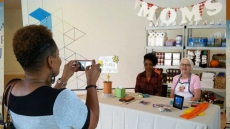TORONTO — A startup based in Waterloo, Ont., is looking to take cannabis cultivation high-tech, but the success of the mobile app-controlled system may hinge on whether new regulations will allow Canadians to grow medical marijuana at home.
Growing your own medical marijuana can be a time-consuming endeavour, says Bjorn Dawson, the co-founder of Grobo and a recent mechanical engineering graduate from the University of Waterloo.
Patients typically spend an average of eight to 10 hours a week making sure their plants have the appropriate amount of water, nutrients and light, Dawson says. Plus there's all that cumbersome equipment, the skunk-like smell wafting through your home and hours spent sifting through online forums trying to figure out what to do, he adds.
"Most people create these DIY systems in a large black tent and they just use timers like you would use on your Christmas lights to automate pumps, lighting, whatever," says Dawson.
"And it feels like you're doing something wrong. I think that's the biggest thing — even though you're allowed, you have this feeling like, 'Maybe I shouldn't be doing this.'"
Enter Grobo, an indoor gardening system pioneered by Dawson and co-founder Chris Thiele, a fellow Waterloo engineering graduate, that promises to give patients their time back by automating the process of growing cannabis.
Dawson and Thiele first created Grobo two and a half years ago for the purpose of growing food indoors during the wintertime, but they soon discovered the product had another application — helping marijuana patients grow their medicine at home.
But the future of home growing remains in question as Dawson and his team await impending regulations from Health Canada.
Currently, marijuana seeds that can be germinated are included under Schedule II of the Controlled Drugs and Substances Act, making them illegal to possess or sell, just like cannabis.
However, patients who were granted a licence under the old medical marijuana regime to grow their own pot have been permitted to keep doing so as the Allard case — named after Nanaimo, B.C., resident Neil Allard, one of four plaintiffs in the case — wound its way through the courts.
In that case, the plaintiffs had challenged whether rules introduced by Ottawa in 2014 that force medical marijuana patients to purchase the drug from licensed producers — rather than growing it at home — were constitutional, given the added expense involved.

Last February, a Federal Court judge sided with the patients, ruling that restricting access to the drug is unconstitutional, and requiring Health Canada to revise its regulations by Aug. 24.
It's unclear whether the new rules will allow patients to grow their own cannabis, but if they do, Dawson says demand for their home growing system could be huge. If not, Grobo can take its product elsewhere, says Dawson.
"There are all kinds of other places where it is legal," he says.
The four-foot-tall tower, which is available for pre-order starting Tuesday but won't ship until next spring, controls lighting, temperature and humidity levels to create optimal growing conditions.
"We have control over the entire environment," says Dawson.
The user pops seeds into coconut husk contained behind glass and tells the Grobo mobile app on their phone what strain they're growing and the system does the rest — watering the plants, dispensing nutrients and adjusting the lighting.
The app also collects and displays an array of data, such as the pH of the water, the presence of any contaminants and how tall a particular plant is in relation to other plants of the same strain being grown by other users.
"This level of data has never existed before," says Dawson.
The system is outfitted with a lock to prevent children from getting access to the drug and a carbon filter to whisk away the smell. It can produce roughly two ounces every two or three months, says Dawson.
While home growing can help patients whittle down their costs — Dawson says that over the course of a year, the savings will have covered the system, currently retailing at US$899 — the real benefits are the time saved and the ability to grow the strains that work best for an individual's particular condition.
Growing cannabis is "difficult and the barrier to entry is incredibly high," says Dawson.
"So we're able to actually lower that, and then allow these people to spend more time getting better and enjoying life. That's the key."





